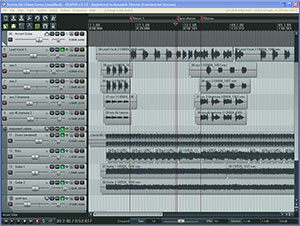 Multitrack recording is one of the coolest things EVER. In the 80s when I first started recording music (okay, you can stop counting now…;)), multi track recording was not something a 15-year-old could afford to do without a major record deal or a family member who owned a studio. But in 2010, anyone can do it, and as long as you have a computer with an internet connection, it doesn’t have to cost you anything at all. Man, I love this century.
Multitrack recording is one of the coolest things EVER. In the 80s when I first started recording music (okay, you can stop counting now…;)), multi track recording was not something a 15-year-old could afford to do without a major record deal or a family member who owned a studio. But in 2010, anyone can do it, and as long as you have a computer with an internet connection, it doesn’t have to cost you anything at all. Man, I love this century.
So what is it? We’re in the 2nd paragraph and you haven’t defined it yet? Okay, I know. But as cool as it is, it requires a bit of care in explanation. First let’s define what a “track” is. The reason why “regular people” didn’t have easy access to multitrack recording back in the day was that we used tape to record. Try to picture a 1-foot length of that brown tape from inside those cassettes we used to listen to music on. If you could see tracks, you’d see two parallel stripes on the tape. When the tape was pulled over the consumer player head, each track would be played separately by the a sensor on the head. One played on the left speaker and one played on the right (the head had two of these, in case that wasn’t clear;)). Still with me? OK, moving on.
Consumer tape recorders/players had enough tape for those two tracks, so we could have stereo (another article on its own). For 4 tracks, or 8 tracks, or 16 tracks, the tape had to be wider and wider and wider. The standard 24-track pro studio tape reels were 2 inches thick, a huge pancake of magnetic ribbon. So the tape recorders required to play and record these monsters were very specialized, very large, and very expensive. But If you COULD get one you could do amazing things, like record something, and record along with it, then record a third along with those two tracks, and so on, and so on.
For example, you could play a song on guitar on one track. Then while you were listening to that play back, you could sing along and record your voice on another track. So now you have only guitar on track 1, and only your voice on track 2. Then you can add bass guitar, a piano part, more vocal parts to sing harmonies, etc. Then you can rewind to the start, hit “play,” and ALL of those tracks play at the same time! How cool is that?
Next you would mix the volumes of all those tracks individually on a mixing board so all the parts can be heard and play together like a real band would.
When I was just starting to record as a teenager, the only way I could make “multitrack” type recordings was to get two tape recorders and two tapes. I’d sing onto one tape and rewind it. Then I play that back and sing along with it while recording on the second tape recorder. Then I would play THAT back (2 versions of my voice) and record a 3rd part onto fresh tape back on the first recorder. The hiss was horrendous and I couldn’t mix the volumes after I was done. But it was still cool.
All a teenager (or any –“ager”) in 2010 has to do is have a computer and download free multitrack recording software and they can do REAL multitrack recording, right now. I recommend a program called Audacity, which is open source software you don’t have to pay for. Then go to the web and watch any of the numerous tutorials on how to use Audacity to do multitrack recording. Home Brew Audio is one such site where you can find articles and video tutorials on all things audio recording. See you there!
Reader Interactions
Comments
Trackbacks
-
Multitrack recording is the coolest thing EVER. Find out more in the latest HBA blog post. http://fb.me/sQQ9UpY5
cool!
I very much wish more home recording tutorials were geared toward newbies who aren’t necessarily techies.
I do wish more home recording tutorials were geared toward newbies who aren’t necessarily techies.